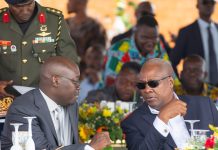Dr Stephen Amoah, a Deputy Minister for Finance, has admonished Ghanaians, especially industry players, not to be carried away by criticisms by opposition against tax policies of the current government saying when they are given the opportunity, they would impose more taxes.
“When government is in power, the one in opposition will do whatever it takes to incite industry against that policy…ask yourself why it is that one incites you against the other, and the same party will come to power to introduce more taxes.”
Dr. Amoah was speaking at the Minister of Finance’s 2014 Mid-Year Budget Development engagement with Civil Society Organisations, Think Tanks, Academia, and Trade Organisations in Accra on Friday July 12, 2024.
He called for a critical look at the issue, particularly when the country’s tax revenue mobilisation is nothing to write home about.
“So (budget) deficit had become part of us. Let’s try and contextualise those issues…you can’t eat your cake and have it.”
The deputy minister acknowledged that widening the tax net and blocking the revenue leakages in the indirect tax mobilisation are major steps to address revenue challenges facing the country.
In addressing some of the concerns raised by the stakeholders, he indicated that next year, 2025, would be very promising, as a lot of things would come on board to eliminate their challenges and cushion the space.
Stakeholders were also urged not to see foreign traders as a threat, but use them as a yardstick to measure the performances of their own businesses.
Dr Amoah said most indigenous businesses are failing because of unconventional tactical approaches, lack of proper structure, planning and financial management.
He added that most indigenous businesses don’t know their value-chain and all they care about is their profit margins and cannot build a financial statement to attract investments and loans.
“Most people cook figures and get some auditors to stamp. Let’s build the foundation properly,” he advised.
The minister continued that while the government was doing its best to put the economy back on its feet, the public must also try to understand how globalisation was changing things and adapt.
He wondered whether indigenous businesses and industries will be able to meet demand if foreign traders are eliminated, especially when majority of them do not even have annual budget that they could live on.
He also blamed inflation on individuals taking advantage to abuse the Ghana’s free market system by adding unreasonable profit margins to their goods to severely impact the economy.
Additionally, he said the black market cannot be decoupled from the low performance of the cedi against major trading currencies.
The engagement forms part of a series of activities by the Ministry to collect inputs from these organisations in preparation for the budget.
In view of previous engagements, the ministry said it introduced, among others, VAT zero rate for locally manufactured sanitary towels, import duty waiver on raw materials for the manufacturing of sanitary towels, extension of VAT zero rate for locally manufactured textiles for two years.
Again, extension of VAT zero rate for locally assembled vehicles for two years and import duty waiver on fishing gear.









